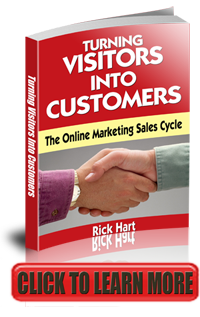Before Facebook changed the face of the Internet, most online marketing depended on getting the Search Engines to rank your website highly in the Search Engine Results Page (SERPS). This was the essence of Search Engine Marketing.
That meant if you wanted to get traffic to your website, and meet new customers, you had to bow to the Google Gods and get them to rank your website highly in their search results. That’s why Search Engine Optimization became such a buzz word and critical marketing tool in the Online Marketing world. And that’s how Google made billions selling advertising (AdWords) on their results page.

When Facebook began to develop a major presence online, along with other sites like YouTube, LinkedIn, and Twitter, and others, Online Marketing was changed forever. A new area of Online Marketing was born called Social Media Marketing.
Some people called this phenomenon Web 2.0 because it was a major shift in how people used the Web. People began to “socialize” online and share their lives and likes and dislikes. Now the web was based on dialogues instead of a one-way monologue.
First it was mostly young people using these websites, but soon more and more people from diverse demographics, and eventually businesses, joined as well. Now it’s rare to find someone who is not participating on Facebook. Or at least it seems that way.
What this meant to a business who wanted to meet customers online was there was now a new “touchpoint,” a new place where they could meet potential customers. Meeting people where they are is the key first step in all online marketing. Search Engines were the only place to meet people online until these Social Media sites began to attract more and more people.
Now that Facebook has over a billion regular members, and sites like Twitter and LinkedIn and others are also gaining popularity, meeting people where they are now means you must have a presence on these Social Media sites as well.
Social Media is Viral
And the other major wrinkle to online marketing that these social sites offer to a marketer is their viral nature. Once someone posts a message on Facebook, that message can spread to all of their friends, and then to their friends’ friends… and so on. This meant if a post goes “viral,” the message in that post could be read by potentially thousands of people.
This characteristic makes Social Media’s potential for marketing very powerful to anyone trying to spread their marketing message. You can literally have thousands of people do this “word-of-mouth” marketing for you.
The “Like” Factor
And a Facebook “friend’s” positive “like” of a message means a lot in terms of trust and credibility. Any good marketer knows that a testimonial is probably the most powerful trust-creating tool there is.
And although a Facebook like is nothing close to a full-fledged testimonial, it does offer a degree of credibility, especially if the friend is trusted or has some authority within the group. And the Facebook mechanism of a “like” means that the message is that much more likely to spread virally.
The Big “But”
But Social Media Marketing is very different from Search Engine Marketing. When someone uses Google to search for a solution to a problem they are actively trying to solve that problem. You could even say they are in buying mode, much like someone when they pulled out the Yellow Pages years ago.
But when someone goes to Facebook they are seldom trying to solve a problem. In fact, you could argue that they are trying to avoid problems. They just want to socialize. Interrupting them at this time with a marketing message could be dangerous for your credibility. You might be “unfriended” and “disliked” very quickly.
You Are Networking
When using Social Media to market your business you must remember you are not selling… you are networking.
Meeting people on Facebook is much like meeting them in a social situation like a bar or a party. It’s not even like business networking that you might do through a Chamber of Commerce or a BNI (Business Networking International) group.
So how you message on Social Media sites if different. Like the BNI motto says, “givers gain” when networking. You must offer something that is helpful and of value to the other person before you will win their attention, let alone their trust.
So when posting on Facebook be careful about spreading your marketing message too aggressively. You must offer helpful information or educational content first to gain trust before you can begin to even mention your solution.
In fact, for some businesses, Facebook is a waste of time. A doctor or lawyer, or many professionals, will not find Social Media particularly helpful unless you have something unique to offer, or your message has some sort of “social” appeal. Professionals will find a more fertile environment for marketing at Social Media sites like LinkedIn, or Twitter. Those sites are more receptive to marketing messages.
Connecting Your Website To Social Media
So how do you use Social Media in the big picture of Online Marketing. Yes you can setup a presence on Facebook itself by getting an account or adding a Business Page to your account. Facebook allows you to have both a “personal” account and a separate page where you can more aggressively promote your business. These Business Pages (sometimes called Fan Pages) can be focussed on your business and you can feel free to talk openly about your business there and perhaps even do some selling. But it’s still a good idea to keep that givers gain mantra in mind.
But it’s still best to think in terms of your Social Media tactics as touchpoints where you meet people and then provide links to your hub business website. Certainly you can provide all aspects of your business messages on your hub website. This should include your email prospect list and your Sales Pages as well as Calls to Action on just about every page.
Driving Prospects To Your Website
The way you drive prospects to your hub site from Social Media is by providing links from your posts/updates/shares to your website. In fact, Facebook will pull pictures and content from your website link and add it to your post.
So if you have a specific page about a particular topic, you can make that Facebook post synchronize with the content on your website. It can be a very effective way to drive people to your website because it makes your post more engaging.
The “link” works in the opposite direction as well. When you put a Facebook button on your website, when people click on that button, a link to that page is added to their Facebook status update and can be seen by all of their friends. And this page can then spread virally through Facebook. LinkedIn and Twitter buttons work in much the same way. Here’s a video that shows you how that works.
Facebook Advertising
Now that Facebook has been around awhile, the territory has changed. Over the years they’ve been collecting tons of information about how we interact and use Facebook. This “demographic” information is Facebook’s big advantage. When you advertise on Facebook you get to use this information to target your ads.
Facebook collects not only information about our likes and dislikes, but and it also keeps track of all our clicks and actions. In other words, they’ve gotten to know us pretty well. This means when you create an ad you have access to information about your target markets in the obvious ways. But it also lets us create campaigns that keep track of how people interact with our ads. Thinks like:
- What links they click on.
- What videos they watch—and for how long.
- What Facebook Groups they interact with.
This is a marketers dream! With the most important skill in marketing being empathy—how well we know our customers—this means we can get to know our customers even better, and customize our ads even more accurately. We can begin to build custom audiences from what we learn, and make sure our ads become more and more personalized over time.
All this has meant that Facebook has become one of the most powerful ways to reach our target markets and has clearly given Google a run for it’s money. In fact, Facebook advertising can be very cost effective compared to Google.
One Caveat
The only problem is…
With all this data, creating ads has become pretty complicated. Sure you can “Boost” any post and get some results. But to really take advantage of all the Facebook brings to the table, you must be a sophisticated marketer. That means not only understanding Facebook demographics, but be able to build far more sophisticated campaigns with pictures, videos and sales funnels that take advantage of the data. Google advertising seems relatively simple after digging deep into Facebook.
What is a link?
One of the big advantages of online marketing, especially on Facebook, is it’s interactivity. People click and move from place to place, and every click is trackable.
So what is a click?
Technically it’s called a hyperlink in Hyper Text Markup Language (HTML). When a hyperlink gets clicked on it moves someone from one location to another. That location can be on another website or even within the same website. It’s actually very simple and easy to do once you’ve created a couple if links.
Without the ability to click and control your experience, the internet would be no better than any newspaper ad in terms of interactivity.
Why does that matter?
When a website visitor clicks they take control of their own destiny. They feel like they are in control, and this makes them more engaged and more likely to remember the message they are following—and more likely to take the Call To Action at the end of the funnel.
And in marketing, nothing is more important than getting prospects and customers to take the action we want them to take. End of story!



